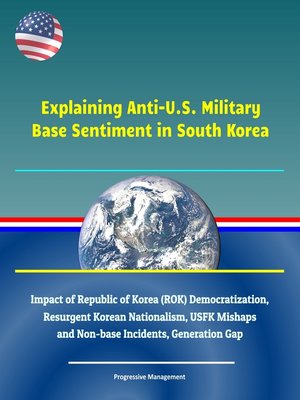Explaining Anti-U.S. Military Base Sentiment in South Korea--Impact of Republic of Korea (ROK) Democratization, Resurgent Korean Nationalism, USFK Mishaps and Non-base Incidents...
ebook

Sign up to save your library
With an OverDrive account, you can save your favorite libraries for at-a-glance information about availability. Find out more about OverDrive accounts.
Find this title in Libby, the library reading app by OverDrive.



Search for a digital library with this title
Title found at these libraries:
| Library Name | Distance |
|---|---|
| Loading... |
This report has been professionally converted for accurate flowing-text e-book format reproduction. The United States has been South Korea's (the Republic of Korea, or ROK) most influential ally since World War II. It helped defend the South from the North's invasion during the Korean War, and South Korea helped the United States during the Vietnam War. Moreover, the United States and South Korea have come to mutually benefit from extensive economic ties. Nevertheless, the security relationship has shifted over time. In the early 2000s, public protests against U.S. military bases in South Korea soared. This thesis asks: Why has anti-U.S. base sentiment emerged and fluctuated in South Korea? It is argued that, since 1987, the democratization of South Korea affected the country's politics, economics, military, and society. During this transition, a number of governments allowed anti-U.S. base sentiment to take root and grow, especially under the administrations of progressive party leaders. In addition, resurgent Korean nationalism during the early 2000s strained U.S.-ROK relations, which also elevated anti-U.S. base sentiment in South Korea. Nonetheless, anti-U.S. sentiment has decreased since conservative party leaders won elections in 2008.
I. Introduction * A. Major Research Question * B. Significance Of The Research Question * C. Literature Review And Potential Explanations And Hypotheses * 1. Explanations for Anti-base Sentiment: Democratization * 2. Explanations for Anti-base Sentiment: Nationalism * 3. Explanations for Anti-Base Sentiment: Other Factors * II. Explanations For Anti-Base Sentiment Democratization * A. Partisan Differences And Anti-U.S. Base Sentiment * B. Democratic Consolidation And Anti-U.S. Base Sentiment * 1. President Roh Taewoo (1988-1993) * 2. President Kim Youngsam (1993-1998) * 3. President Kim Daejung (1998-2003) * 4. President Roh Moohyun (2003-2008) * 5. President Lee Myongbak (2008-2013) * 6. President Park Geunhye (2013-2017) * C. Media Expansion And Anti-U.S. Base Sentiment * Iii. Explanations For Anti-Base Sentiment: Korean Nationalism * A. Emergence Of Nationalism After 1987 * B. Nationalism's Influence In Anti-U.S. Base Sentiment * C. Conclusion * Iv. Other Factors Shaping Anti-U.S. Protest * A. USFK Members' Mishaps And Security Threat Level * B. Non-Base Incidents * C. Threat Perception And International Relationships * D. Generation Gap In Society * E. Economic Growth * V. Conclusion * A. Findings * B. Implications For The U.S.-Rok Alliance * C. Conclusion: Democratization * D. Conclusion: Korean Nationalism * E. Conclusion: Other Factors







